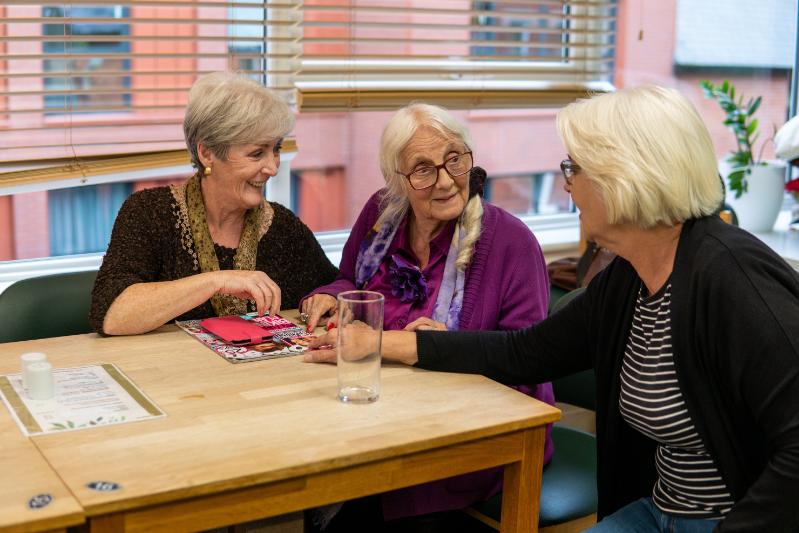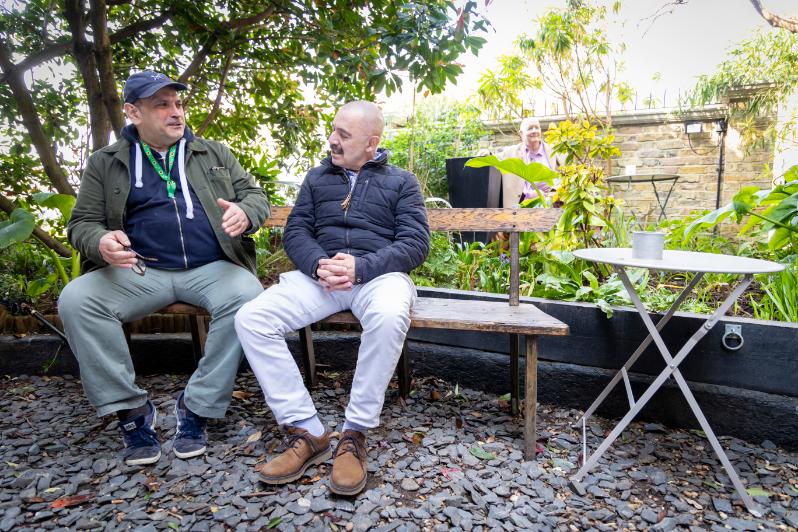Research Themes
-
Chronic Illness, Disability, Biomarkers -
Individuals participating in NICOLA had the opportunity to provide biological samples, which we are analysing to identify biomarkers associated with health and social characteristics.
The NICOLA Biomarker Research Group, led by Professor Frank Kee (QUB) are working locally, and with international colleagues across research themes, to identify new biomarkers that help predict and diagnose diseases, track responses to selected medications, and provide insights for a range of behaviours. We have a choice of biomarkers (including biochemistry, genetic, epigenetic, and transcriptomic data) on a subset of the NICOLA cohort. The long-term nature of our NICOLA resource enables us to evaluate changes in biopsychosocial measures over time, ultimately helping to maximise healthy ageing.
Our NICOLA team have a very collegial, collaborative approach and welcome opportunities to discuss research considering using NICOLA’s biomarker resources; please contact nicola-research@qub.ac.uk
More Facts About Biomarkers:
What is a biomarker?
A biomarker is a short name for a ‘biological marker’. A biomarker is a biological characteristic that can be measured accurately, reproducibly, and acts as an indicator of health and disease. Biomarkers are very helpful tools to evaluate normal and abnormal biological processes, but they are also used in many scientific fields”. We are primarily using biomarkers to develop tools that promote healthy ageing for individuals living in Northern Ireland.What are biochemistry biomarkers?
Biochemistry biomarkers are measured in blood and urine samples, often as a routine part of healthcare. For example, routine biochemistry biomarkers include monitoring blood sugar levels in people with diabetes, or cholesterol levels as part of an annual health check. Measuring biochemistry biomarkers is routinely used to help doctors determine how badly a heart attack has damaged a person’s heart.What are genetic biomarkers?
Genetic biomarkers come from our DNA and can show variations that we inherit from our parents (such as eye colour), or acquire throughout life (such as cancer).What are epigenetic biomarkers?
Epigenetic biomarkers provide a link between DNA that we inherit from our parents and our environment. For example, if a person has an inherited biomarker that makes them more likely to gain weight easily (genetic biomarker)……but eats a very healthy diet and takes regular exercise (epigenetic biomarker due to environment)……then they are unlikely to be overweight.What are transcriptomic biomarkers?
Transcriptomic biomarkers come from blood samples and help tell us how well the messages in DNA are being understood in our bodies.Current members of the NICOLA Biomarker Research Group include:
- Dr Amy Jayne McKnight (a.j.mcknight@qub.ac.uk)
- Professor Frank Kee (f.kee@qub.ac.uk)
- Professor Jayne Woodside (j.woodside@qub.ac.uk)
- Finance
For information on current research, please contact the Project Manager:
Amanda Coulter
a.coulter@qub.ac.uk - Mental Health and Health Services Research
The NICOLA Mental Health Research Group, led by Professor Michael Donnelly (QUB) is dedicated to improving understanding about how bio-psychosocial factors affect the development and disruption of mental health, well-being and quality of life (QoL) of older people in N Ireland and in comparison with ageing populations in other countries. One of the ways in which the current NI population of people over 50 years old differs from populations elsewhere is via their early experiences of the politico-civic conflict known as ‘the Troubles’ and, so, our analyses investigate the impact of the conflict on mental health and substance use.
In addition, the interests of researchers in this research group include: investigating changes over time in the levels of mental health status, well-being and quality of life among the older population and the identification of risk factors and psychological and social factors which promote and maintain these key outcomes; examining life events and transitions as people age and the effects of factors such as age, gender, socio-economic status, informal care, resilience and social networks on mental health and well-being; analysing the development and onset of co- and multi-morbidity particularly in relation to the availability and use of health care and informal care and the impact on the key outcomes; and the health and well-being of informal carers of people with mental health problems.
Current members of the NICOLA Mental Health Research Group include:- Professor Dermot O’Reilly (d.oreilly@qub.ac.uk)
- Professor Michael Donnelly (michael.donnelly@qub.ac.uk)
- Dr Sharon Cruise (s.cruise@qub.ac.uk)
- Nutrition
Dietary factors have been suggested to play a role in promoting healthy ageing. The NICOLA Nutrition Research Group, led by Professor Jayne Woodside (QUB) is dedicated to exploring how diet and lifestyle factors may affect various health outcomes and chronic disease risk, including cardiovascular disease, diabetes, dementia, eye diseases, frailty and dementia. As part of this we are also exploring new methods for assessing dietary intake. Our aim is to unravel the potential role of diet in healthy ageing. The results of this research will ultimately lead to appropriate, evidence-based, dietary guidelines for older people to promote healthy ageing, in the context of an ageing population worldwide.
Current members of the NICOLA Nutrition Research Working Group include:- Prof Jayne Woodside (j.woodside@qub.ac.uk)
- Dr Charlotte Neville (c.neville@qub.ac.uk)
- Dr Claire McEvoy (c.mcevoy@qub.ac.uk)
-
Physical Activity
As we age, physical activity declines. The NICOLA Physical Activity Working Group, led by Professor Mark Tully (UU) are interested in how this decline impacts on the development of chronic diseases, mental health and cognition, and frailty. We are particularly interested in the relationship between physical activity and risk of falling, through our measures of strength and balance. Sedentary behaviour, or time spent sitting, is an emerging risk factor, and we will be assessing the impact of changes in time spent sitting on health. Current members of the NICOLA physical activity Research Group include:
- Professor Mark Tully (m.tully@ulster.ac.uk)
- Socio-economic and Socio-demographic Health, Healthcare Utilisation
The NICOLA Health and Social Care Research Working Group, led by Professor Dermot O'Reilly is dedicated to conducting analyses of NICOLA data in order to improve understanding about the care needs and the uptake and use of health and social services in relation to the health status and well-being of older people in N Ireland and in comparison with health systems and policies for ageing populations in other countries. In addition, there are particular interests in end of life care and the role and use of informal care and family carers as well as in non-statutory service provision in the context of the NI system of caring for older people.
Current members of the NICOLA Health and Social Care Research Group include:- Dermot O’Reilly (d.oreilly@qub.ac.uk)
- Michael Donnelly (michael.donnelly@qub.ac.uk)
- Sharon Cruise (s.cruise@qub.ac.uk)
- Social environment
- Vision Health
The Eye Health Research Group, led by Dr Ruth Hogg is dedicated to exploring age related eye diseases and eye health.
We are also interested in understanding lifestyle factors which may affect the development of eye diseases such as age related macular degeneration, glaucoma and diabetic retinopathy. We collect a wide range of data related to eye health including visual acuity and self-reported vision.
Current members of the NICOLA Eye Health Research Group include:- Dr Ruth Hogg (r.hogg@qub.ac.uk)




Our social environment, such as maintaining our relationships and connectedness with other people, is an important aspect of ageing well. Participation in a range of activities are also vital to our health and wellbeing, the economy and society as a whole. Some of these activities may be paid (for example, employment), whilst others are unpaid (such as caring for others, involvement with clubs and organisations, and volunteering).
In contrast, a lack of social relationships and connectedness can be key factors in feeling lonely. There has been increased awareness of the detrimental effects of social isolation (lack of relationships) and loneliness (unwelcome feelings about a lack of contact with other people) to our health and wellbeing.
Therefore, the NICOLA Study has included questions to help us understand the social environment of people in Northern Ireland as they get older. This research will also help us explore the relationships between social isolation, loneliness, social participation, and healthy ageing.
Current members of the NICOLA Social Environment Research Group, led by Dr Paula Devine (QUB) include: